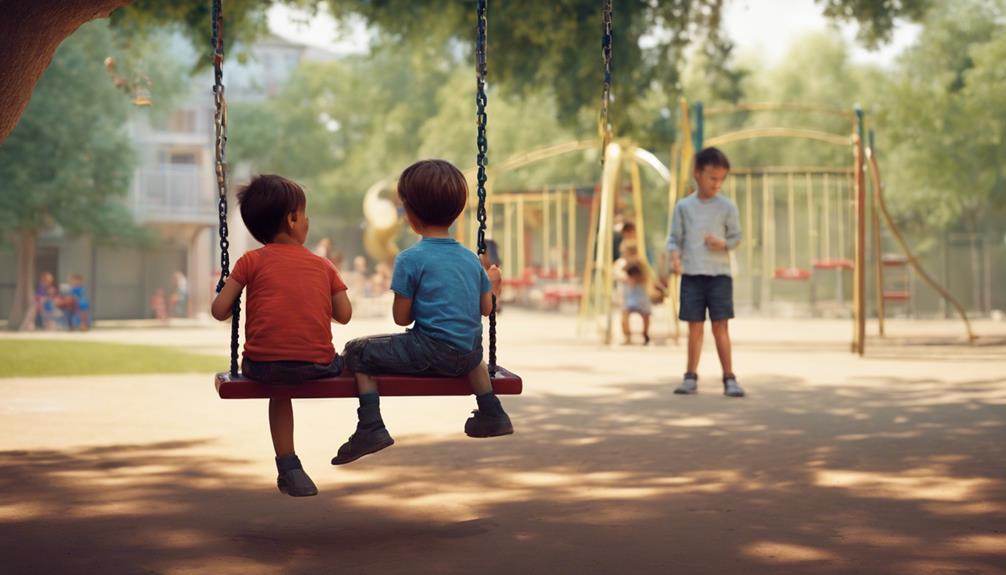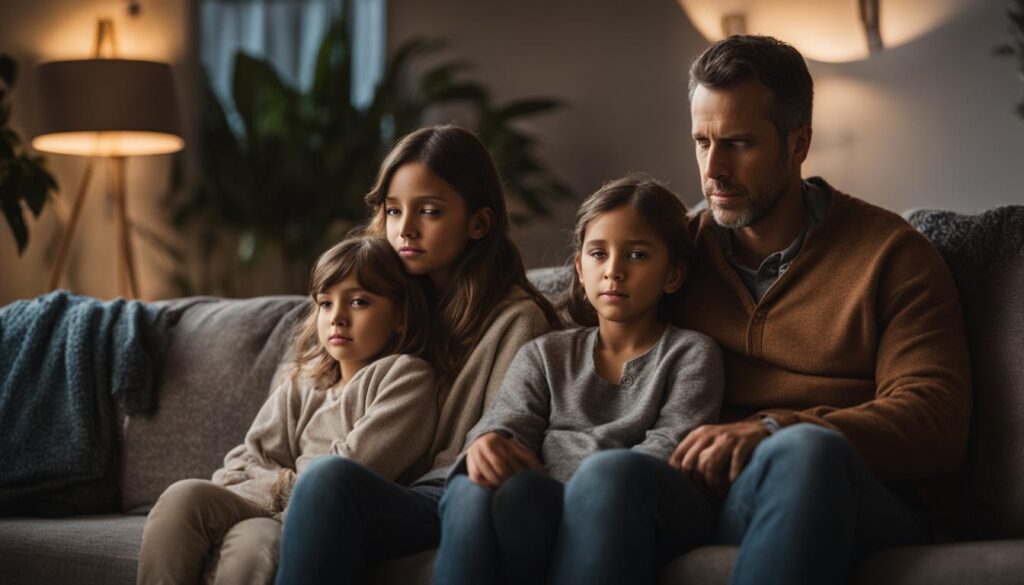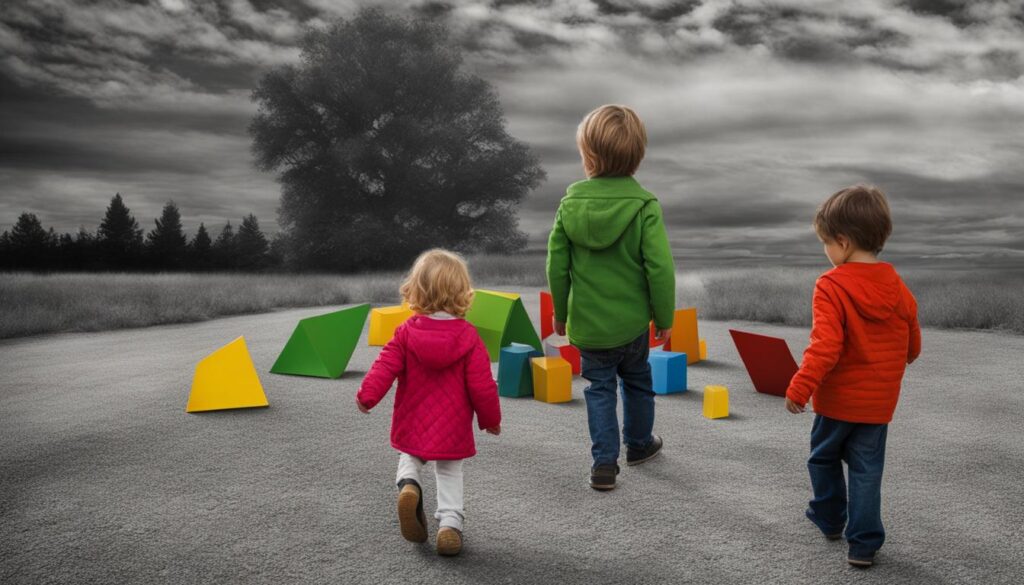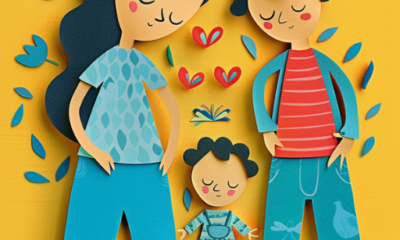Supporting Children Through Divorce
How Children Talk About Divorce: Insights and Tips
Journey into the intricate realm of children's communication during divorce, where hidden emotions and resilient spirits await discovery.

When discussing how children discuss divorce, it can feel like navigating a difficult maze with unexpected twists and turns.
Understanding the nuances of children's communication during this challenging time is crucial. By exploring the intricacies of their emotions and reactions, we can provide invaluable support and guidance.
Join us as we delve into the multifaceted world of children's perspectives on divorce, offering insights and practical tips for fostering understanding and resilience in the face of familial change.
Key Takeaways
- Encourage open and honest conversations to support children's emotional expression.
- Tailor discussions to children's age for effective communication about divorce.
- Create a safe space for children to express feelings and receive reassurance.
- Use positive and supportive communication strategies to help children navigate divorce discussions.
Encouraging Honest Communication
Encouraging open and honest communication with children during divorce is essential for their emotional well-being and understanding of the situation. Parents play a crucial role in creating a supportive environment where children feel safe to express their feelings about the divorce. It's vital to listen attentively to what the child is saying, providing reassurance and support as they navigate through this challenging time. By actively engaging in conversations about divorce, parents can help their children feel validated and understood.
Children may have a range of emotions when it comes to divorce, and it's important for parents to help them navigate these feelings. Creating a space where the child feels comfortable expressing themselves without fear of judgment is key. By offering a listening ear and showing empathy, parents can support their children in processing their emotions effectively. This open line of communication can strengthen the parent-child bond and foster a sense of security during a period of change.
Age-Appropriate Conversations

When discussing divorce with children, it is crucial to tailor the conversations to their age and maturity level. Young children may need simpler explanations and reassurance of love and stability, while school-aged children might require more detailed information and opportunities for open dialogue. It's essential to acknowledge and validate children's feelings and concerns about the divorce, creating a safe space for them to ask questions and express their emotions openly.
| Young Children | School-aged Children | Books about Divorce |
|---|---|---|
| Children need | Make sure | Kids to express |
| Living together | Fantasy and reality | Divorced Parents |
| Guide for Changing Families |
For young children, books about divorce can be a helpful tool to explain the situation in a way that is easy for them to understand. For school-aged children, discussing the reality of the changes while also addressing any fantasies they may have about their parents getting back together is crucial. Encouraging kids to express their thoughts and emotions openly can foster a sense of security and understanding during this challenging time.
Understanding Children's Perspectives
Understanding children's perspectives on divorce can reveal a range of emotions and reactions influenced by their age, personality, and past experiences. Children may express confusion, sadness, anger, or worry about divorce. Some children might feel relieved or even happy about their parents' divorce. Others could struggle with loyalty conflicts or feel caught in the middle.
Encouraging open dialogue can help children express their thoughts and emotions about the divorce. It's essential to create a safe space where children feel comfortable sharing their feelings openly. By listening attentively and validating their emotions, parents can gain valuable insights into how their children perceive and internalize the changes happening within the family dynamic.
Understanding children's perspectives is crucial in supporting them through this challenging time, fostering trust, and strengthening the parent-child relationship.
Nurturing Emotional Support

To nurture emotional support for children during divorce, we prioritize creating a safe and open environment where their feelings are heard and validated. Kids need to feel heard and understood without judgment. Encouraging them to express their emotions, whether it's sadness, anger, or confusion, can help them process the changes that come with divorce. Reassuring your child of your love and support is crucial in helping them feel secure during this challenging time. It's essential to make talking to your kids a regular and comfortable part of your routine, showing them that their emotions matter.
Maintaining a positive relationship with both parents can also provide a sense of stability for children. However, some kids may need extra support to navigate their feelings, and seeking professional help is a valuable option. Remember, the most important thing is to support your child emotionally, listen actively, and provide a safe space for them to express themselves.
Effective Communication Strategies
Navigating effective communication strategies with children during divorce involves understanding the importance of respecting their comfort levels to encourage openness and creating a safe space for conversations. When engaging in conversations with children about divorce, it's crucial to employ communication strategies that foster a positive and supportive environment. Here are some key strategies to consider:
- Ask appropriate questions to gauge readiness: By asking questions that are appropriate to their age and understanding, you can assess their readiness to engage in conversations about the divorce without overwhelming them.
- Respect comfort levels to encourage open communication: Creating a safe and comfortable space for children to express their thoughts and feelings can help promote open communication and trust.
- Lighten the mood if they seem uncomfortable: Using humor or light-hearted activities can help ease tension and create a more relaxed atmosphere for discussions.
- Maintain healthy dialogue by keeping conversations positive: It's essential to speak positively about the other parent to foster a healthy dialogue and avoid negativity.
Frequently Asked Questions
What Are Children's Views on Divorce?
Children's views on divorce vary based on age, understanding, and emotional maturity. Younger ones may struggle to grasp the concept, feeling confused or insecure. Older children might comprehend better but still experience sadness, anger, or relief.
What to Say When Your Child Asks Why You Got Divorced?
We told our child we got divorced because adults sometimes can't resolve disagreements. We assured them it wasn't their fault and we made this choice to improve our family. We encouraged questions and feelings sharing.
At What Age Can a Child Understand Divorce?
We start to understand divorce as young as 3-5, grasping more complexities by 6-8, and feeling its impact in preteens at 9-12. By adolescence, ages 13-18, we delve deeper into its implications on relationships and identity.
Which of the Following Are Preschoolers Common Responses to Separation or Divorce?
Preschoolers commonly respond to separation or divorce with behaviors like clinginess, bedwetting, and thumb sucking. They may express confusion, sadness, or anger through their actions or play. Seeking reassurance and attention, they cope with changes in family dynamics.
– Can the Way Children Talk About Divorce Affect their Coping Strategies in High Conflict Divorces?
The way children talk about divorce can impact their effective high conflict divorce coping strategies. Open communication and support can help children process their feelings and develop healthy coping mechanisms. Encouraging children to express themselves can lead to better emotional outcomes during and after a divorce.
Conclusion
In conclusion, it's crucial to create a safe space for children to openly express their feelings about divorce. Remember, 82% of children of divorced parents feel sad and confused about the situation.
By encouraging honest communication, understanding their perspectives, and providing emotional support, parents can help their children navigate this challenging time with resilience and understanding. Remember, open communication and support are key in helping children cope with divorce effectively.
Sarah’s voice is one of the first you’ll encounter at How Get Divorce, and it’s one you’ll come to trust. As a writer, she brings relatability and approachability to complex topics, making them understandable for everyone. As our Community Moderator, Sarah fosters a welcoming and supportive environment, encouraging open dialogue and connection among our members. Her ability to relate to others and moderate discussions makes her an integral part of our team and community.
Supporting Children Through Divorce
Moving Away From Children After Divorce: a Parent's Guide
Prepare for the unexpected twists and turns of relocating after divorce as a parent, exploring the complexities and considerations that lie ahead.

Navigating the process of moving away from your children after a divorce can feel like walking through a dense fog, unsure of what lies ahead. The decision can be overwhelming due to the various legal, emotional, and logistical aspects involved, but understanding these factors is crucial.
As parents, we are faced with delicate choices that can impact our children's well-being and our relationships. Let's explore how to approach this challenging transition with clarity and compassion, considering the complexities involved in relocation and the importance of prioritizing the needs of our children above all else.
Key Takeaways
- Understand Family Law implications and custody guidelines before relocating post-divorce.
- Prioritize effective communication and collaboration with the ex-spouse for a smooth transition.
- Develop a comprehensive parenting plan focusing on children's well-being and maintaining relationships.
- Seek professional legal assistance to navigate custody agreements, modifications, and compliance with relocation laws.
Legal Considerations for Relocation
Have you considered the legal requirements for relocating with your child after divorce? Moving away with children post-divorce can have a significant impact on your relationship with them and the other parent. Under Family Law, it's crucial to understand the implications of such a move. Whether you're the parent moving away or the one staying, navigating custody and child support arrangements requires careful consideration and adherence to legal guidelines. Seeking legal advice early on can help you understand your rights and responsibilities in this process.
When contemplating a move, involving the other parent in discussions about the relocation and obtaining their consent is essential. If an agreement can't be reached, seeking court approval is necessary to prevent custody complications down the line. Written agreements documenting the new custody arrangements can provide clarity and protect both parents' rights. Remember, courts prioritize the best interests of the children when making decisions about post-divorce relocation. Effective communication and cooperation with your ex-spouse are key to successful co-parenting after a move.
Communication With Ex-Spouse

How can we ensure effective communication with our ex-spouse when discussing relocation plans after divorce?
It's essential to approach these conversations with openness and honesty to navigate this challenging situation successfully. Here are some tips to help maintain a positive dialogue with your ex-spouse:
- Clearly explain your intentions for moving away, emphasizing the reasons behind your decision.
- Highlight the positive impact that the relocation can have on the children to show how it aligns with their best interests.
- Listen actively to your ex-spouse's concerns and perspectives, fostering understanding and cooperation.
- Collaborate on creating a mutually beneficial agreement that addresses both the emotional and logistical aspects of moving away after divorce.
Developing a Parenting Plan
When considering developing a parenting plan post-divorce, it is crucial to establish clear guidelines for visitation schedules and transportation arrangements that prioritize the children's well-being. Ensuring the new child custody arrangements include detailed plans for maintaining the children's relationship with the noncustodial parent is essential. This demonstrates a commitment to co-parenting and putting the children's best interests first. Ongoing communication plays a pivotal role in nurturing the parent-child relationship and supporting the children's well-being. Including specific modes of communication with the other parent in the parenting plan can facilitate smoother interactions and promote a healthy co-parenting dynamic. To help visualize the components of a comprehensive parenting plan, we have provided a table below outlining key elements to consider:
| Aspect | Details | Importance |
|---|---|---|
| Visitation Schedules | Clearly defined times for each parent | Ensures consistency |
| Transportation Arrangements | Logistics for pickups and drop-offs | Facilitates smooth transitions |
| Communication Modes | Methods for parent interactions | Promotes effective co-parenting |
Professional Legal Assistance

For expert guidance on relocation after divorce, consulting with a New Haven Child Custody Lawyer at McConnell Family Law Group is highly recommended. Seeking professional legal assistance is crucial to ensure compliance with Connecticut Child Relocation laws and the protection of parental rights. Here are some reasons why legal help is essential in navigating the process of moving away from children post-divorce:
- Developing a Detailed Parenting Plan: Experienced attorneys can provide valuable assistance in developing a comprehensive parenting plan that considers the best interests of the children.
- Safeguarding Parental Rights: Consulting with a family law attorney specializing in relocation matters can help safeguard your parental rights and ensure that decisions benefit the children.
- Navigating the Legal Process: Professional legal guidance is essential for navigating the complex legal procedures and requirements involved in relocation cases.
- Preserving Children's Relationships: Legal assistance can help in creating arrangements that prioritize maintaining close relationships between the children and both parents.
Seeking legal support is crucial to handle the challenges of relocation after divorce while prioritizing the well-being of the children and protecting parental rights.
Navigating Custody Agreements
Navigating custody agreements post-divorce can be a complex process that requires careful consideration and legal guidance to ensure the best outcomes for both parents and the children involved.
When contemplating moving away after a divorce, it's imperative to understand custody laws and the implications of relocation on existing agreements. Seeking legal representation is crucial in navigating the complexities of custody disputes and obtaining permission from the court or the other parent to relocate with the children.
Modification of custody orders may be necessary to establish a new parenting plan and visitation schedule that prioritizes the child's relationship with both parents. Emphasizing the importance of maintaining a strong parent-child relationship even when separated by distance is key in creating a supportive environment for the children during this transition.
Frequently Asked Questions
What Age Is Most Affected by a Parents Divorce?
We believe children between 6 and 12 are most impacted by parents' divorce. Emotional distress, insecurity, and behavioral changes are common. Younger kids may struggle to grasp implications, while teens might show defiance or withdrawal. Communication and support are vital.
What's the Hardest Age for Children to See Their Parents Split?
We understand that seeing parents split can be toughest for children between 9 to 12 years old. They may grapple with abandonment and loyalty conflicts. Consistent support and open communication are vital for helping them navigate this challenging time.
How Do You Move Away From a Child After Divorce?
We understand the complexities of moving away from a child after divorce. Obtaining legal approval and fostering open communication with the other parent are crucial. Developing a detailed plan ensures the child's well-being during the transition.
Will a 4 Year Old Remember Divorce?
Yes, a 4-year-old may remember divorce. Even if specific details fade, the emotional impact can linger. Our support is crucial as they navigate these memories, shaping their emotional growth and future relationships.
Conclusion
As we journey through the complexities of post-divorce child relocation,
let's remember the importance of clear communication, detailed parenting plans,
and seeking professional guidance.
By navigating these challenges with grace and understanding,
we can create a path towards a brighter future for both ourselves and our children.
Remember, like a compass guiding us through rough waters,
our resilience and determination will lead us to calmer shores.
Sarah’s voice is one of the first you’ll encounter at How Get Divorce, and it’s one you’ll come to trust. As a writer, she brings relatability and approachability to complex topics, making them understandable for everyone. As our Community Moderator, Sarah fosters a welcoming and supportive environment, encouraging open dialogue and connection among our members. Her ability to relate to others and moderate discussions makes her an integral part of our team and community.
Supporting Children Through Divorce
Effective Co-Parenting Tips for Divorced Parents

Did you know that approximately 40-50% of marriages in the United States end in divorce? This alarming statistic highlights the growing importance of effective co-parenting strategies among divorced parents. Co-parenting is crucial in protecting the well-being and happiness of children affected by these situations.
Divorce can be a challenging experience for both parents and children, but with the right approach, it is possible to create a positive environment where children can thrive. In this article, we will explore practical co-parenting tips to help divorced parents navigate this journey and prioritize the well-being of their children.
Key Takeaways:
- Prioritize the needs of the children over personal issues
- Establish effective communication and problem-solving strategies
- Maintain consistency in routines, rules, and expectations
- Respect personal boundaries and shield children from conflicts
- Put the child’s best interests first in all decisions and actions
The Importance of Co-Parenting
Co-parenting plays a vital role in ensuring that children’s needs are met and that they grow up in a supportive and stable environment. By actively involving both parents in their lives, co-parenting allows children to feel secure and loved, fostering their overall well-being.
Children thrive when they have consistent rules and discipline from both parents. Co-parenting provides an opportunity for parents to establish and maintain these consistent boundaries, ensuring that children receive consistent guidance and structure in their lives.
Moreover, successful co-parenting serves as a positive example of problem-solving for children. When parents are able to work together and communicate effectively, they show their children how to navigate challenges and resolve conflicts in a healthy manner.
“Co-parenting provides children with a stable and supportive environment, helping to build their mental and emotional well-being.”
Co-parenting also contributes to the mental health and emotional well-being of children. When children have regular contact and healthy relationships with both parents, they experience a sense of belonging and security. This stable and positive environment enhances their emotional stability and strengthens their overall mental health.
By prioritizing the needs of the children and fostering open communication, co-parenting can create a harmonious and supportive environment that promotes the well-being of children.
Benefits of Co-Parenting:
- Children feel secure and loved
- Consistent rules and discipline
- Positive problem-solving examples
- Enhanced mental and emotional well-being
When parents prioritize co-parenting and work together for the benefit of their children, they create a strong foundation for the children’s future success and happiness. The importance of co-parenting cannot be understated, as it enables children to thrive and grow into confident, resilient individuals.
Putting the Children First
The best co-parenting starts with prioritizing the children’s needs over personal issues. It’s crucial to build a relationship focused on the well-being of the children. This means separating the personal relationship and establishing a new one centered solely on co-parenting.
When parents divorce or separate, the needs of their children should always be at the forefront of their minds. It can be easy to get caught up in personal conflicts and emotions, but putting the children first is essential for their overall well-being. By prioritizing the children’s needs, parents can create a positive and supportive co-parenting environment.
This involves setting aside personal differences and focusing solely on what is best for the children. By doing so, parents can create a stable and nurturing environment in which their children can thrive.
“Putting the children first means understanding that their needs should always come before any personal disagreements or conflicts.”
This approach involves separating the personal relationship between the parents from the co-parenting relationship. It requires both parents to set aside their differences and work together to meet the children’s needs.
When prioritizing the children, parents must strive to create a consistent and reliable routine for them. This includes coordinating schedules, making joint decisions regarding the children’s education and healthcare, and ensuring that rules and discipline are consistent across both households.
By prioritizing the well-being of the children, parents can foster a sense of stability and security in their lives. This, in turn, can contribute to their emotional and mental well-being.
Key Takeaways:
- Putting the children first is essential for successful co-parenting.
- Parents should separate the personal relationship from the co-parenting relationship.
- Creating a consistent routine and coordinating schedules helps meet the children’s needs.
- By prioritizing the children’s well-being, parents can create a stable and nurturing environment.
| Benefits of Putting the Children First |
|---|
| 1. Improved emotional well-being for the children. |
| 2. Increased stability and consistency in their lives. |
| 3. Development of a positive and supportive co-parenting relationship. |
| 4. Strengthened parent-child relationships. |

Managing Emotions and Communication
Co-parenting can be challenging, especially when it comes to managing emotions and communication. Emotions are natural and can run high, but it’s crucial to find healthy outlets for them and avoid venting to the children. Instead, staying focused on the child’s best interests is key to maintaining a positive co-parenting environment.
Effective communication is essential for successful co-parenting. When communicating with your co-parent, it’s important to set a business-like tone, keeping the conversations respectful and child-focused. This helps create an atmosphere of understanding and cooperation, even when discussing difficult topics.
“Effective communication is not just about expressing oneself; it’s also about listening and understanding the other person’s perspective.”
By actively listening to each other, you can foster better understanding and empathy. This can lead to a more productive and collaborative co-parenting relationship, benefiting both you and your child.
When faced with anger or conflict, finding resolution is essential. Instead of letting anger and negative emotions drive the conversation, strive for resolution and problem-solving. This can be achieved through constructive discussions and compromise. Remember, your child’s well-being should always be the ultimate goal.
Communication Tips for Co-Parents:
- Set a business-like tone to maintain professionalism.
- Listen actively and empathetically to understand each other’s perspectives.
- Keep conversations child-focused, prioritizing the child’s best interests.
- Avoid blaming, criticizing, or speaking negatively about the other parent.
- Use “I” statements to express your feelings and concerns without attacking the other person.
- Seek professional help, such as family therapy, if communication challenges persist.
Remember, effective communication and managing emotions are essential for successful co-parenting. By creating a respectful and child-focused environment, you can navigate challenges and cultivate a positive co-parenting relationship.
Establishing Effective Communication
Open communication is the cornerstone of successful co-parenting. By establishing effective communication strategies, co-parents can navigate challenges, share information, and make decisions together. Here are some communication strategies and tools that can help foster a healthy co-parenting relationship.
1. Technology Tools for Co-Parenting
When face-to-face discussions are difficult, technology tools can bridge the communication gap. Co-parenting apps, such as [Insert Real Co-Parenting App Name], provide a centralized platform for sharing calendars, exchanging information, and coordinating schedules. These tools can streamline communication and reduce misunderstandings, allowing for efficient co-parenting.
“Using co-parenting apps has made it so much easier for us to stay organized and communicate effectively. It keeps everything in one place and eliminates the need for constant back-and-forth emails or texts.”
– Sarah, a divorced parent.
2. Setting a Positive Tone
The tone of communication sets the stage for effective co-parenting. It’s important to maintain a positive and respectful tone, focusing on the well-being of the children. By avoiding blame and criticism, co-parents can create a supportive environment conducive to open and honest discussions.
3. Making Requests Instead of Demands
When expressing needs or concerns, phrasing them as requests rather than demands can promote a collaborative atmosphere. Using “I” statements and framing conversations as problem-solving opportunities can help co-parents find common ground.
“I’ve found that by framing my concerns as requests and focusing on what’s best for our child, my ex-partner is more willing to listen and work together to find solutions. It’s made a big difference in our communication.”
– Mark, a divorced parent.
4. Active Listening and Perspective-Taking
Active listening is a fundamental component of effective communication. Co-parents should listen attentively to each other’s perspectives, validating their experiences and emotions. By practicing empathy and perspective-taking, co-parents can foster understanding and find mutually beneficial solutions.
5. Seeking Professional Help for Conflict Resolution
Despite best efforts, conflicts may arise in co-parenting relationships. In such cases, seeking professional help, such as family therapists or mediators, can be invaluable. These professionals can provide guidance and facilitate constructive discussions to navigate challenges and find resolutions.

| Communication Strategies | Description |
|---|---|
| Use of Technology Tools | Utilize co-parenting apps to centralize communication and enhance coordination. |
| Setting a Positive Tone | Maintain a respectful and supportive atmosphere in all communications. |
| Making Requests Instead of Demands | Frame concerns as requests, focusing on collaborative problem-solving. |
| Active Listening and Perspective-Taking | Listen attentively and empathetically, seeking to understand each other’s perspectives. |
| Seeking Professional Help | Engage family therapists or mediators for conflict resolution. |
Consistency in Co-Parenting
Establishing consistent routines, rules, discipline, and expectations between households is crucial for ensuring children’s stability in a co-parenting arrangement. While it is natural for parenting styles to differ, maintaining consistency in major decisions, such as schooling and medical care, is vital for the overall success of co-parenting. By prioritizing consistency, divorced parents can create a predictable and secure environment that supports their children’s well-being.
Consistency in co-parenting helps children feel a sense of stability and security, which can foster their emotional and mental development. When expectations and routines are consistent in both households, children can easily adapt to the different dynamics and have a clear understanding of what is expected of them.
One way to establish consistency is by implementing regular routines and schedules that both parents adhere to. This can include consistent meal times, bedtimes, and extracurricular activities. Consistency in these daily routines provides children with a sense of predictability and reassurance, allowing them to feel more secure in their co-parenting situation.
“Consistency is key in co-parenting. By creating a stable and predictable environment, parents can help their children adapt and thrive.”
Consistent rules and discipline are also essential in co-parenting. By setting and enforcing consistent rules, parents send a clear message to their children about behavioral expectations, regardless of which household they are in. This promotes a sense of fairness and equality, helps children understand boundaries, and develops their self-discipline.
To illustrate the importance of consistency in co-parenting, the table below presents a comparison of the impact of inconsistent versus consistent co-parenting on children:
| Effect of Inconsistent Co-Parenting | Effect of Consistent Co-Parenting |
|---|---|
|
|
Focusing on Major Decisions
While consistency is essential throughout everyday routines, it is equally important to establish consistency in major decisions impacting the child’s life. Collaborating on significant matters, such as schooling, medical care, and religious upbringing, ensures that parents maintain a unified front and make choices that are in the best interest of the child.
By discussing and agreeing upon these major decisions, parents can present a united and consistent approach, preventing confusion and providing children with the stability they need. Parents can also consider using online co-parenting tools, such as shared calendars and communication platforms, to facilitate the decision-making process and achieve consistency.

Setting Boundaries
Respecting personal boundaries is essential for maintaining a healthy and successful co-parenting relationship. When divorced parents establish clear boundaries, they create an environment that promotes effective communication and minimizes conflicts. By prioritizing personal boundaries, parents can shield their children from unnecessary stress and maintain a positive co-parenting dynamic.
One important aspect of setting boundaries is maintaining privacy. It is crucial to avoid discussing personal matters or disagreements in front of the children. By keeping adult conversations private, parents protect their children from being exposed to conflicts that can negatively impact their well-being. Creating a safe space where children can thrive without being caught in the middle of personal issues is a fundamental aspect of co-parenting.
Another way to set boundaries is by avoiding using children as messengers. Engaging children in communication between parents can burden them with adult issues and place them in uncomfortable situations. Instead, divorced parents should establish direct lines of communication or use technology tools specifically designed for co-parenting, ensuring that important information flows smoothly between them.
“Respecting personal boundaries and shielding children from conflicts allows them to grow up in a supportive and stable co-parenting environment.”
By respecting personal boundaries and shielding children from conflicts, divorced parents create a nurturing environment that prioritizes the well-being of their children. This enables the children to grow up in a supportive and stable co-parenting dynamic, free from unnecessary stress and anxiety.
Shielding children from conflicts is a critical aspect of co-parenting success. It prevents children from feeling torn between their parents and protects their emotional stability. By maintaining personal boundaries and focusing on the welfare of their children, divorced parents can foster a healthy co-parenting environment that benefits everyone involved.
Flexibility in Co-Parenting
Flexibility is an essential aspect of successful co-parenting. Life circumstances are constantly changing, and being adaptable is key to maintaining a healthy co-parenting relationship. Parents must be willing to adapt to changes in schedules, routines, and parenting responsibilities while keeping the best interests of their child at the forefront.
Adapting to changes requires effective problem-solving skills. Co-parents should work collaboratively to find solutions that meet the evolving needs of their child. This may involve adjusting parenting time, accommodating extracurricular activities, or addressing any unforeseen challenges that arise.
It’s important to approach problem-solving with a focus on open communication, respectful dialogue, and a willingness to compromise. By fostering a problem-solving mindset, co-parents can navigate through difficult situations and maintain a harmonious co-parenting relationship.
As co-parents prioritize the child’s best interests, they may need to make sacrifices and adjust their own expectations. Flexibility allows parents to adapt to the changing needs and circumstances of their child, ensuring they receive the necessary support and care from both parents.
Remember, flexibility in co-parenting not only benefits the child but also helps reduce tension, conflicts, and stressful situations between parents. By embracing change and being open to new possibilities, co-parents can create a more stable and positive environment for their child’s upbringing.
Putting the Child First
When it comes to co-parenting, the well-being and best interests of the child should always be the top priority. By focusing on fostering healthy relationships, positivity, and creating a secure and loving environment, parents can ensure their child thrives in a post-divorce situation.
Encouraging a healthy relationship with both parents is crucial for the child’s emotional and psychological development. This means supporting and facilitating regular and meaningful contact between the child and each parent. Whether through shared custody or visitation arrangements, maintaining a consistent and positive connection with both parents helps the child feel loved, valued, and secure.
Creating a positive environment goes beyond just the relationship between the parents. It also involves fostering positivity in the child’s daily life. This can be achieved by encouraging open communication, showing respect, and modeling healthy conflict resolution. By promoting positive values and behaviors, parents can create an atmosphere of love, support, and emotional well-being for their child.
| Ways to Put the Child First in Co-Parenting |
|---|
| Encourage a healthy relationship with both parents |
| Foster positivity in the child’s daily life |
| Promote open communication and healthy conflict resolution |
| Create an environment of love, support, and emotional well-being |
“The happiness, security, and overall well-being of the child should always be the guiding principles in co-parenting.”
By prioritizing the child’s best interests, parents can navigate the challenges of co-parenting with clarity and purpose. When decisions and actions are centered around the child’s needs, they can grow and thrive in a healthy and supportive environment. Remember, co-parenting is a journey that requires continual effort, understanding, and love for the benefit of the child.
Conflict Resolution
Resolving conflicts is an essential component of successful co-parenting. When disagreements arise, it’s important to address them constructively to maintain a harmonious relationship.
First and foremost, keeping calm is crucial when discussing sensitive issues. Emotions can run high, but maintaining a level-headed approach fosters open communication and better problem-solving.
“The key to resolving conflicts is finding common ground.” – Dr. Emily Thompson, Family Therapist
Seeking common ground allows both parties to work towards a mutually beneficial solution. This involves actively listening to each other’s perspectives and being willing to compromise when necessary. By focusing on shared goals and the best interests of the children, conflicts can be resolved more effectively.
However, in some cases, professional help may be needed to navigate complex conflicts. Family therapists and mediators specialize in co-parenting dynamics and conflict resolution. They can provide guidance, facilitate constructive discussions, and offer practical strategies for finding common ground.
Benefits of Professional Help for Conflict Resolution
- Neutral third party: A professional mediator or therapist can provide an unbiased perspective, helping to defuse tension and facilitate productive discussions.
- Effective communication strategies: Professionals can teach co-parents techniques for improving communication, such as active listening and using “I” statements.
- Conflict resolution skills: Therapists and mediators can guide co-parents in developing effective problem-solving skills, enabling them to tackle future conflicts more constructively.
- Preserving the co-parenting relationship: Seeking professional help demonstrates a commitment to co-parenting success and shows a willingness to put aside personal issues for the well-being of the children.
Remember, conflict resolution is an ongoing process in co-parenting. By staying open-minded, seeking common ground, and utilizing professional help when needed, parents can overcome conflicts and maintain a healthy co-parenting relationship.
| Benefits of Conflict Resolution | Professional Help |
|---|---|
| Promotes a positive co-parenting relationship | Neutral third party offers unbiased guidance |
| Reduces stress and tension | Teaches effective communication strategies |
| Enhances children’s well-being | Guides co-parents in conflict resolution skills |
| Fosters a cooperative and supportive environment | Preserves the co-parenting relationship |

The Effects of Co-Parenting on Children
Successful co-parenting has significant effects on children’s well-being and emotional stability. When divorced parents are able to co-parent effectively, it positively impacts various aspects of their children’s lives, fostering a healthy environment for their development.
Increased Security
Children who experience successful co-parenting feel a sense of security. They have the assurance that both parents are actively involved in their lives, providing a stable and supportive foundation. This security helps children navigate life’s challenges with confidence and resilience.
Healthy Relationships
Co-parenting allows children to maintain strong relationships with both parents. When parents work together to put their children’s needs first, it fosters a sense of love, acceptance, and connection. These healthy relationships contribute to a child’s emotional well-being and create a strong bond within the family unit.
Emotional Well-being
Children thrive in environments where their emotional needs are met. Successful co-parenting provides the emotional support and stability necessary for children to develop positive self-esteem, resilience, and emotional intelligence. They learn healthy ways to regulate their emotions and navigate relationships.
Strong Family Connections
Co-parenting facilitates the maintenance of strong family connections despite the separation of parents. By prioritizing effective co-parenting, children continue to experience a sense of belonging and family unity. This strengthens their overall well-being and provides a valuable support system throughout their lives.
Overall, co-parenting has a profound impact on children’s lives. When parents successfully navigate co-parenting, children benefit from increased security, healthy relationships, emotional well-being, and strong family connections. However, poor co-parenting can have detrimental effects on children’s mental health, leading to anxiety, emotional instability, and difficulty adapting to new circumstances. It is crucial for divorced parents to prioritize effective co-parenting to ensure the long-term well-being of their children.
Conclusion
In conclusion, co-parenting is essential for divorced parents to create a positive and supportive environment for their children. By prioritizing effective communication, consistency, boundaries, and flexibility, parents can establish a stable co-parenting relationship that benefits their children’s well-being. It is crucial to focus on the child’s needs above personal differences and seek professional support when necessary.
By fostering a positive co-parenting environment, children can thrive emotionally, mentally, and socially. Consistent routines, rules, and discipline provide stability, while open communication and problem-solving strategies help resolve conflicts constructively. Successful co-parenting requires mutual respect, understanding, and a shared commitment to the child’s best interests.
Remember, co-parenting is a journey that requires ongoing effort and adjustments. Seeking support from professionals, such as therapists or co-parenting coaches, can provide valuable guidance and help navigate challenges along the way. By prioritizing co-parenting and creating a positive environment, parents can ensure their children’s well-being and set them up for a successful future.
FAQ
What is co-parenting?
Co-parenting is a parenting arrangement where divorced or separated parents share the responsibilities of raising their children together. It involves collaboration, communication, and cooperation to ensure the well-being and needs of the children are met.
Why is co-parenting important?
Co-parenting is important because it allows both parents to play an active role in their children’s lives. It provides a stable and supportive environment for the children, which contributes to their emotional and mental well-being. Co-parenting also helps to maintain strong relationships between the children and both parents.
How can I put the children first in co-parenting?
To put the children first in co-parenting, it is essential to prioritize their needs over personal issues. This means separating personal relationships and establishing a new relationship focused solely on co-parenting. The well-being of the children should always be the main priority in decision-making and communication.
How can I manage emotions and communicate effectively in co-parenting?
Managing emotions in co-parenting requires finding healthy outlets for emotions, avoiding venting to the children, and staying focused on the child’s best interests. Effective communication involves setting a business-like tone, listening actively, and keeping conversations child-focused. It may also be helpful to seek professional help in conflict resolution.
What are some strategies for establishing effective communication in co-parenting?
To establish effective communication in co-parenting, consider using technology tools like co-parenting apps when face-to-face discussions are difficult. It is also important to set a positive tone, make requests instead of demands, and listen to each other’s perspectives. Seeking professional help can assist with conflict resolution and improving communication.
How important is consistency in co-parenting?
Consistency is crucial in co-parenting as it provides stability for the children. Establishing consistent routines, rules, discipline, and expectations between households helps create a secure and predictable environment for the children. While parenting styles may differ, focusing on major decisions like schooling and medical care is essential for co-parenting success.
What boundaries should be set in co-parenting?
Setting personal boundaries in co-parenting is important to maintain a healthy co-parenting environment. This includes respecting privacy, avoiding personal discussions, and not using children as messengers between parents. By keeping children out of conflicts and shielding them from adult issues, parents can create a safe and supportive space for their children.
How can I be flexible in co-parenting?
Flexibility is necessary in co-parenting as life circumstances change. It is crucial to adapt to changes in schedules and work collaboratively with the other parent to problem-solve. Being open to compromise and prioritizing the child’s best interests are key in maintaining a successful co-parenting relationship.
What does it mean to put the child first in co-parenting?
Putting the child first in co-parenting means encouraging a healthy relationship between the child and both parents. It involves fostering positivity, ensuring the child feels secure and loved, and making decisions and taking actions that prioritize the child’s well-being. All co-parenting efforts should be focused on creating a healthy and supportive environment for the child.
How can conflicts be resolved constructively in co-parenting?
Resolving conflicts in co-parenting requires keeping calm, finding common ground, and seeking professional help if needed. Constructive discussions and a willingness to compromise are essential in finding solutions that benefit both parents and the child. Professionals trained in conflict resolution can provide guidance and assistance in navigating challenging situations.
What are the effects of co-parenting on children?
Successful co-parenting has numerous benefits for children, including increased security, healthier relationships, improved emotional well-being, and stronger family connections. On the other hand, poor co-parenting can have negative effects on children’s mental health, leading to anxiety, emotional instability, and difficulty adapting to new circumstances.
What is the importance of co-parenting for divorced parents?
Co-parenting is essential for divorced parents to provide a positive and supportive environment for their children. By focusing on effective communication, consistency, setting boundaries, flexibility, and prioritizing the child’s needs, parents can create a stable co-parenting relationship. Seeking professional help can assist in navigating challenges and ensuring the well-being of children.
Maya brings a wealth of experience in providing emotional support to individuals facing life’s challenges. Her contributions to How Get Divorce are characterized by empathy, understanding, and a profound sense of authority on matters of emotional well-being. Maya’s work is dedicated to ensuring that our community feels supported and understood, offering tools and advice to cope with the emotional aspects of divorce.
Supporting Children Through Divorce
Helping Kids Navigate Divorce: A Parent’s Guide

Did you know that around 40-50% of marriages in the United States end in divorce? This means that millions of children are faced with the challenges and changes that come with their parents splitting up. Helping children navigate their parents’ divorce and offering them support during these tough times is crucial for their emotional well-being and long-term resilience.
Divorce can be overwhelming for children of all ages, but there are steps that parents can take to help them navigate this journey with understanding and care. By providing support, open communication, stability, and seeking additional resources, parents can create a positive environment for their children to cope and adjust.
Key Takeaways:
- Divorce affects a significant percentage of marriages in the United States.
- Guiding children through divorce is crucial for their emotional well-being.
- Open communication and support are essential during this challenging time.
- Providing stability and structure helps children feel secure.
- Seeking additional support and resources can make the process easier for both parents and children.
Telling Your Children about the Divorce
When it comes to talking to children about divorce, it’s crucial to approach the conversation with honesty and age-appropriate language. The goal is to provide a child-friendly explanation of divorce that helps them understand the situation without overwhelming them.
Using simple and clear language, explain to your children that the parents can no longer get along. Emphasize that this decision does not change your love for them and reassure them that you will continue to care for them. Let them know that the divorce is not their fault and that they are not alone in facing the changes that lie ahead.
Address any changes that will occur in their lives, such as living arrangements or school, in a calm and reassuring manner. Let them know that you, as their parents, will support them through these changes and work together to make the transition as smooth as possible. By presenting a united front and avoiding blaming the other parent, you can help your children feel more secure and reduce their anxiety.
“Mommy and Daddy have decided that it’s best for us to live in separate houses, but we both still love you very much. We will always be your parents, and we will take care of you no matter what. We understand that this might be hard for you, but we will face these changes together as a family.”
Remember to encourage your children to ask questions and express their feelings. Let them know that it’s normal to feel sad, angry, or confused about the divorce. By creating an environment where they feel comfortable sharing their emotions, you can help them process their feelings and adapt to the changes more effectively.
Addressing Common Concerns
During the conversation, address any common concerns your children may have. Reassure them that both parents will still be involved in their lives and that they will have the opportunity to spend quality time with each parent. Make sure they understand that they are not responsible for the divorce and that it is not their fault.
It’s important to be patient and understanding with your children as they process the news. Reiterate your love and support for them throughout the conversation and beyond. Let them know that you are there to listen to their thoughts and feelings whenever they need to talk.
Talking to your children about divorce is a delicate and sensitive task, but by approaching the conversation with empathy, honesty, and reassurance, you can help them navigate this difficult time with resilience and understanding.
Helping Children grieve the divorce
Divorce can be a significant loss for children, causing a range of complex emotions. It is crucial for parents to provide support and guidance to help their children grieve and adjust to the new circumstances. By addressing their emotions, validating their feelings, and assuring them of continued love, parents can play a vital role in helping children cope with the loss during divorce.
Encourage Expression of Feelings
Supporting children’s emotions starts with creating a safe space for them to express their feelings. Encourage your children to share their thoughts, fears, and concerns without judgment. Let them know that their emotions are valid and that it’s okay to feel angry, sad, or confused. By actively listening and engaging in empathetic conversations, parents can help their children find words to articulate their emotions.
Be Patient with the Process
Grieving is a dynamic and individual process that varies from child to child. Understand that their feelings may change over time and be patient with their journey. Allow them to grieve at their own pace and provide ongoing support as they navigate through different stages of grief. Reassure them that it’s normal to experience a range of emotions and that healing takes time.
By addressing their emotions, validating their feelings, and assuring them of continued love, parents can play a vital role in helping children cope with the loss during divorce.”
Reassure Unconditional Love
Children may blame themselves for their parents’ divorce. It is important for parents to reassure their children that the divorce is not their fault and that both parents love them unconditionally. Emphasize that the decision to divorce was between the adults and does not impact the parent-child relationship. Remind them that they are valued, cherished, and supported by both parents.
Support from External Resources
While parents play a critical role in supporting their children’s grief, seeking additional support can be beneficial. Consider involving a counselor or therapist who specializes in children’s grief during divorce. These professionals can provide expert guidance and help children develop healthy coping mechanisms. Additionally, support groups or community resources may provide valuable outlets for children to connect with peers who are going through similar experiences.
By acknowledging children’s grief, offering empathetic support, and seeking additional resources when needed, parents can help their children navigate the emotional challenges of divorce. Providing a comforting environment and ensuring ongoing communication can contribute to the healing process and help children develop resilience as they adjust to their new family dynamics.
Providing Stability and Structure
Maintaining stability and structure in a child’s daily life is crucial to help them feel secure during the divorce process. By establishing consistent routines and effectively communicating expectations, parents can create a sense of normalcy for their children. This stability can greatly contribute to their emotional well-being and overall adjustment during this challenging time.
Parents can implement various strategies to provide stability for their children. One effective way is to establish regular mealtimes, homework schedules, and bedtime routines. These routines not only offer a sense of structure but also provide a predictable environment for the child. Even though some flexibility may be required, try to maintain the routines as much as possible to create a familiar and stable foundation for your child.
Setting and enforcing rules and limits are also essential in providing stability. Clear expectations and consistent consequences help children understand boundaries and ensure a harmonious environment. This not only promotes their feelings of security but also teaches them valuable life skills, such as responsibility and accountability.
| Key Points | Benefits |
|---|---|
| Establish consistent routines | Creates a sense of normalcy and predictability for the child |
| Communicate expectations | Helps the child feel secure and understand boundaries |
| Set and enforce rules | Promotes a harmonious environment and teaches valuable life skills |
While divorce brings significant changes and uncertainties, maintaining stability and structure can provide a stabilizing force in a child’s life. It offers them a sense of normalcy and control amidst the upheaval. By prioritizing stability, parents can create an environment where their children can thrive and develop resilience.

Taking Care of Yourself
During the divorce process, it’s crucial to prioritize your own well-being so that you can effectively support your children. Self-care is not selfish; it is an essential part of managing stress and maintaining balance. By taking care of yourself, you can navigate the challenges of divorce with resilience and strength.
To manage stress during this difficult time, engage in regular exercise. Physical activity releases endorphins, which can improve your mood and reduce anxiety. Whether it’s going for a walk, practicing yoga, or hitting the gym, find an activity that you enjoy and make it a regular part of your routine.
Eating a healthy diet is another important aspect of self-care. Nourishing your body with nutritious foods will help you maintain energy levels and improve your overall well-being. Make sure to include plenty of fruits, vegetables, whole grains, and lean proteins in your meals. Remember to stay hydrated by drinking an adequate amount of water each day.
Getting enough rest is essential for managing stress and promoting emotional well-being. Aim for seven to eight hours of quality sleep each night. Create a bedtime routine that allows you to unwind and relax before bed, such as reading a book or practicing relaxation techniques.
Seeking support from friends, family, or a therapist can make a significant difference in your ability to cope with the challenges of divorce. Talking about your feelings and concerns with someone who understands can provide emotional relief and valuable perspective. Don’t hesitate to reach out to your support network when you need it.
“Taking care of yourself is not selfish, it’s necessary for your own well-being and the well-being of your children.”
Engaging in self-care activities is crucial for maintaining a sense of joy and fulfillment amidst the stress of divorce. Find time for hobbies or activities that bring you happiness, whether it’s reading, gardening, painting, or playing a musical instrument. These activities not only provide a much-needed break but also promote your overall mental well-being.
Remember, taking care of yourself is not a luxury; it’s a priority. By prioritizing your well-being, managing stress, and practicing self-care, you are better equipped to support your children and navigate the challenges of divorce.
Managing Conflict with Your Ex
In order to promote the well-being of your children, it is crucial to effectively manage and minimize conflict with your ex-spouse. This involves prioritizing open and respectful communication throughout the co-parenting journey. By agreeing in advance on explanations for the divorce and presenting a united front to your children, you can provide them with a sense of stability and understanding.
| Ways to Manage Conflict | Benefits |
|---|---|
| 1. Maintain open and respectful communication | – Promotes a healthier co-parenting relationship. |
| 2. Agree on explanations for the divorce | – Provides children with a unified and consistent understanding of the situation. |
| 3. Seek compromises and shared decision-making | – Fosters a cooperative and harmonious co-parenting environment. |
| 4. Set boundaries and establish routines | – Creates stability and a sense of normalcy for your child. |
Remember, the primary focus should always be on the well-being and emotional security of your children. By implementing effective conflict management strategies, you can provide a supportive co-parenting environment that minimizes stress and promotes healthy development for your child.

Negotiating Agreements
When co-parenting after a divorce, negotiating agreements with your ex-spouse is crucial for creating a healthy and cooperative parenting relationship. By focusing on finding solutions that prioritize the well-being of your child, you can establish a foundation for effective co-parenting. If conflicts arise and communication becomes challenging, seeking mediation or professional assistance can provide valuable guidance and help resolve differences.
It’s important to approach negotiations with a willingness to compromise and take turns making decisions. This shared decision-making process allows both parents to have a voice in important matters concerning their child. By actively engaging in negotiations, you can demonstrate your commitment to the best interests of your child and foster a productive co-parenting dynamic.
Negotiating agreements is an essential aspect of co-parenting after divorce. It allows parents to work together, find common ground, and create a framework that supports their child’s well-being.” – Dr. Emily Peterson, Family Psychologist
Remember that co-parenting is a long-term commitment, and the ability to resolve conflicts in a constructive manner is key. By prioritizing open communication, flexibility, and the best interests of your child, you can navigate co-parenting agreements and ensure a supportive environment for your child’s growth and development.

Collaborative Decision-Making in Co-Parenting
| Benefits | Implementation |
|---|---|
| Encourages cooperation | Establish clear communication channels |
| Promotes shared responsibility | Hold regular co-parenting meetings |
| Reduces conflict and stress | Seek professional assistance if needed |
| Fosters healthy parent-child relationships | Be open to compromise and flexibility |
Seeking Additional Support
During the challenging process of divorce, it’s important for both parents and children to have the right support system in place. Fortunately, there are various resources available to help you navigate this difficult time and provide the necessary assistance for your family’s well-being.
Divorce Support Groups
Consider joining divorce support groups to connect with individuals who understand and can empathize with your situation. These groups provide a safe space for sharing experiences, gaining insights, and receiving emotional support from others who are going through similar challenges. You can find local support groups through community centers, places of worship, or online platforms.
Therapist for Children of Divorce
Professional counseling can make a significant difference in helping children cope with the emotional impact of divorce. A trained therapist can provide a safe and supportive environment where your child can express their feelings and develop healthy coping mechanisms. Look for therapists who specialize in working with children of divorce to ensure they have the expertise and knowledge to address your child’s specific needs.
Resources for Co-Parenting
Co-parenting successfully requires effective communication and collaboration between both parents. Explore resources that can assist you in navigating this aspect of divorce. You may find books, online courses, or workshops that offer practical advice and strategies for positive co-parenting. Additionally, many schools offer programs or services specifically designed to support children from divorced families. Reach out to your school’s guidance counselor or social worker for information on available resources.
Don’t hesitate to lean on your support network, including friends and family, during this challenging time. They can provide emotional support and practical assistance when needed. Remember, seeking additional support is not a sign of weakness, but a proactive step towards ensuring your well-being and the best outcomes for your children.
| Resources | Description |
|---|---|
| Divorce Support Groups | Join local or online support groups to connect with others and receive emotional support during the divorce process. |
| Therapist for Children of Divorce | Seek professional counseling for your child to help them navigate the emotional challenges of divorce. |
| Co-Parenting Resources | Explore books, courses, and workshops that provide guidance on effective co-parenting strategies. |
| School Programs and Services | Inquire about resources and support available for children of divorced families at your child’s school. |
Conclusion
Navigating the divorce process can be challenging for both parents and children. However, by providing support, open communication, and stability, parents can guide their children through this difficult time. It’s important to prioritize the emotional well-being of children and to acknowledge their feelings and experiences.
By establishing consistent routines and clear expectations, parents can help their children cope with the changes brought about by divorce. Modeling calm and avoiding conflict in front of the children can promote a sense of safety and security. Seeking support from friends, family, or a therapist can be beneficial for both parents and children.
Remember, co-parenting is a long-term commitment. Ongoing cooperation, communication, and compromise are essential in creating a healthy co-parenting relationship. By prioritizing the best interests of the child and seeking professional assistance when needed, parents can ensure a smoother transition and help their children develop resilience in the face of adversity.
In conclusion, guiding children through the divorce process requires empathy, patience, and a commitment to their well-being. By providing love, support, and stability, parents can help their children navigate the challenges of divorce and create a brighter future.
FAQ
How can I talk to my children about divorce?
When telling your children about the divorce, it’s important to be honest and keep the conversation age-appropriate. Use simple and clear language to explain that the parents can no longer get along. Reassure your children that your love for them has not changed and that you will continue to care for them. Address any changes that will occur in their lives, such as living arrangements or school, and let them know that you will face these changes together. Avoid blaming the other parent, and present a united front as much as possible.
How can I help my children grieve the divorce?
Divorce can be a significant loss for children, and it’s important to help them grieve and adjust to the new circumstances. Encourage your children to express their feelings and listen to them without judgment. Help them find words to articulate their emotions and assure them that it’s okay to be honest. Understand that their feelings may change over time, and be patient with their process. Reassure your children that both parents will continue to love them and that the divorce is not their fault.
How can I provide stability and structure for my children during the divorce?
Maintaining stability and structure in your child’s daily life can help them feel secure during the divorce. Establish consistent routines and communicate their expectations to your child. This can include regular mealtimes, homework schedules, and bedtime routines. While some flexibility may be necessary, try to stick to the routines as much as possible. Setting and enforcing rules and limits can also provide a sense of stability for your child.
How can I take care of myself during the divorce process?
It’s important to prioritize your own well-being during the divorce process so that you can be there for your children. Engage in regular exercise, eat a healthy diet, and get enough rest to manage stress. Seek support from friends, family, or a therapist if needed. Take time for self-care activities and engage in hobbies or activities that bring you joy. Remember that taking care of yourself is not selfish but necessary for your own well-being and the well-being of your children.
How can I manage conflict with my ex-spouse for the well-being of my children?
It’s important to find ways to effectively manage and minimize conflict with your ex-spouse for the well-being of your children. Focus on maintaining open and respectful communication. Agree in advance on explanations for the divorce and present a united front to your children. Seek compromises and shared decision-making when it comes to co-parenting. If necessary, set boundaries and establish routines for your home to provide stability for your child.
How can I negotiate agreements with my ex-spouse for healthy co-parenting?
Negotiating agreements with your ex-spouse can help create a healthy co-parenting relationship. Focus on finding solutions that benefit the well-being of your child. Seek mediation or professional assistance if necessary. Be willing to compromise and take turns making decisions. Remember that co-parenting is a long-term commitment, and it’s important to prioritize the best interests of your child.
Where can I find additional support during the divorce process?
There are various resources available to support parents and children during the divorce process. Consider joining a divorce support group or seeking professional counseling for yourself and your child. Many schools offer programs or services for children going through a divorce. Reach out to friends and family for support, and don’t hesitate to ask for help when needed. Remember that seeking support is essential for your own well-being and the well-being of your children.
How can I guide my children through the divorce process?
Navigating the divorce process can be challenging for both parents and children. However, by providing support, open communication, and stability, parents can guide their children through this difficult time. Prioritizing children’s emotional well-being and seeking additional support when needed can contribute to a smoother transition and help children develop resilience. Remember that co-parenting is a long-term commitment, and ongoing cooperation and communication are essential for the well-being of your children.
Maya brings a wealth of experience in providing emotional support to individuals facing life’s challenges. Her contributions to How Get Divorce are characterized by empathy, understanding, and a profound sense of authority on matters of emotional well-being. Maya’s work is dedicated to ensuring that our community feels supported and understood, offering tools and advice to cope with the emotional aspects of divorce.
-

 Life After Divorce1 month ago
Life After Divorce1 month agoTD Jakes: Life After Divorce – A Journey of Healing
-

 Supporting Children Through Divorce2 weeks ago
Supporting Children Through Divorce2 weeks agoPositive Effects of Divorce on Children: A Guide to Understanding
-

 Navigating the Divorce Process4 weeks ago
Navigating the Divorce Process4 weeks agoUnderstanding Dominican Republic Divorce Law
-

 Navigating the Divorce Process3 weeks ago
Navigating the Divorce Process3 weeks agoNavigating the Complexity: Divorce Document Preparation Services Explained
-

 Coping Strategies3 weeks ago
Coping Strategies3 weeks ago10 Emotional Support Techniques for Coping With Divorce
-

 Financial Aspects2 weeks ago
Financial Aspects2 weeks agoFinancial Advisor's Guide to Navigating Divorce Finances
-

 Navigating the Divorce Process3 weeks ago
Navigating the Divorce Process3 weeks agoDivorce Lawyers New Orleans: Your Ultimate Guide to Legal Separation and Family Law
-

 Navigating the Divorce Process3 weeks ago
Navigating the Divorce Process3 weeks agoNavigating Divorce with a Muslim Divorce Lawyer




































